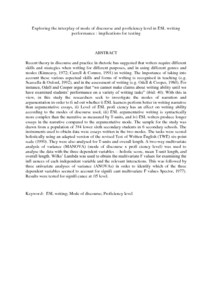Citation
Md Rashid, Sabariah and Chan, Swee Heng
(2008)
Exploring the interplay of mode of discourse and proficiency level in ESL writing performance: implications for testing.
The English Teacher, 37.
pp. 105-122.
ISSN 0128-7729
Abstract
Recent theory in discourse and practice in rhetoric has suggested that writers require different skills and strategies when writing for different purposes, and in using different genres and modes (Kinneavy, 1972; Carrell & Connor, 1991) in writing. The importance of taking into
account these various aspectual skills and forms of writing is recognised in teaching (e.g. Scarcella & Oxford, 1992), and in the assessment of writing (e.g. Odell & Cooper, 1980). For instance, Odell and Cooper argue that “we cannot make claims about writing ability until we have examined students’ performance on a variety of writing tasks” (ibid: 40). With this in view, in this study the researchers seek to investigate the modes of narration and argumentation in order to fi nd out whether i) ESL learners perform better in writing narrative than argumentative essays, ii) Level of ESL profi ciency has an effect on writing ability according to the modes of discourse used, iii) ESL argumentative writing is syntactically more complex than the narrative as measured by T-units, and iv) ESL writers produce longer essays in the narrative compared to the argumentative mode. The sample for the study was drawn from a population of 384 lower sixth secondary students in 6 secondary schools. The instruments used to obtain data were essays written in the two modes. The tasks were scored holistically using an adapted version of the revised Test of Written English (TWE) six-point scale (1990). They were also analysed for T-units and overall length. A two-way
multivariate analysis of variance (MANOVA) (mode of discourse x profi ciency level) was used to analyse the data with the three dependent variables —holistic score, mean T-unit length, and overall length. Wilks’ Lambda was used to obtain the multivariate F values for examining the infl uences of each independent variable and the relevant interactions. This was followed by three univariate analyses of variance (ANOVAs) in order to identify which
of the three dependent variables seemed to account for signifi cant multivariate F values Spector, 1977). Results were tested for signifi cance at .05 level.
Download File
![[img]](http://psasir.upm.edu.my/14665/1.hassmallThumbnailVersion/Exploring%20the%20interplay%20of%20mode%20of%20discourse%20and%20proficiency%20level%20in%20ESL%20writing%20performance.pdf)  Preview |
|
PDF (Abstract)
Exploring the interplay of mode of discourse and proficiency level in ESL writing performance.pdf
Download (188kB)
| Preview
|
|
Additional Metadata
Actions (login required)
 |
View Item |

